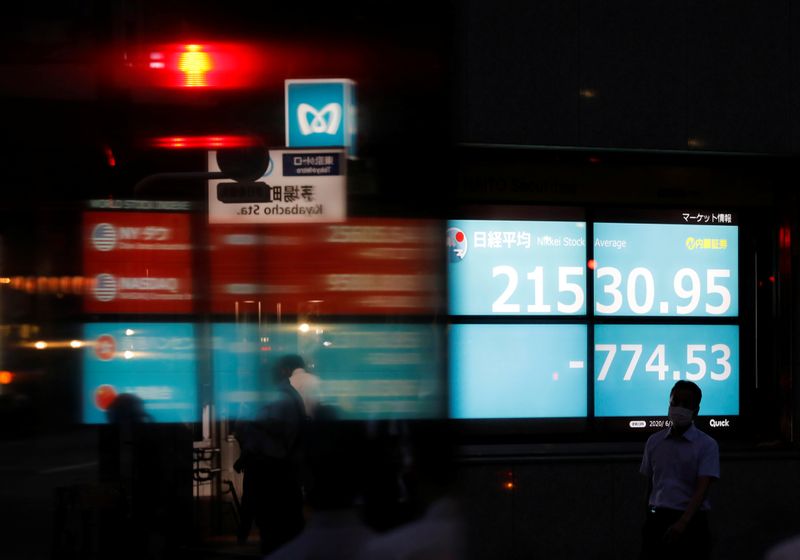By Stanley White and Sumeet Chatterjee
TOKYO/HONG KONG (Reuters) - Asian shares rallied and the dollar fell on Tuesday as risk appetite was bolstered by the formal start of the Federal Reserve's corporate bond buying programme, and earlier worries about a second wave of coronavirus infections eased.
Improving sentiment also pushed up Wall Street futures with e-Minis for the S&P 500 rising 1.6% following a late U.S. stocks rally on Monday. Treasury yields rose and the yield curve steepened.
The Fed said it will start purchasing corporate bonds on Tuesday in the secondary market, one of several emergency facilities launched in the wake of the coronavirus pandemic.
A flood of liquidity in the form of fiscal and economic stimulus, along with uneven but steady re-openings of state and local economies, sparked a sharp rally in the stock market since its late-March trough.
"Equities were overbought and corrected lower, but the S&P 500 has bounced off support because of the Fed," said Shane Oliver, head of investment strategy and chief economist at AMP (OTC:AMLTF) Capital Investors in Sydney.
"The markets will continue to go higher as long as economies continue to reopen and as long as the number of coronavirus cases is not large enough to stop the reopening."
The investor sentiment was also boosted by a Bloomberg News report that the Trump administration is preparing a nearly $1 trillion infrastructure proposal as part of its push to spur the world's largest economy back to life.
MSCI's broadest index of Asia-Pacific shares outside Japan rose 3.2%, its biggest one-day gain since March 25. Australian stocks rose 4.4%, while shares in China rose 1.2%.
European markets were also set for a strong opening with pan-region EuroSTOXX 50 futures rising nearly 3.0%, German DAX futures gaining 3.1% and FTSE futures trading up 2.6% by 0534 GMT.
Sentiment in Asia was also helped by data showing there were 27 new coronavirus cases in Beijing, down from 36 new cases the previous day. Beijing banned high-risk people from leaving the capital to stop the spread of a fresh outbreak.
Japan's Nikkei stock index closed up 4.9%, its biggest daily gain since March 25, while shares in South Korea were up 4.8%.
But some analysts were not convinced about the strength of the gaining momentum.
"With pricing across the risk spectrum now rich, we expect further gains to be more selective, differentiated and volatile...on fears of a COVID-19 second wave and concerns about their extended valuations," Barclays (LON:BARC) analysts wrote in a research note on Tuesday.
Against a basket of currencies the dollar eased 0.1% to 96.44, almost 1% below Monday's high of 97.396. The risk-sensitive Australian dollar sits more than 2% above a two-week low hit on Monday, and rose 0.6% to $0.6968 on Tuesday.
The yen was little changed at 107.33 per dollar. The Bank of Japan kept monetary settings steady on Tuesday and stuck to its view that the economy will gradually recover from the coronavirus pandemic.
The Fed on Monday also announced eagerly-awaited details of its programme to lend funds directly to companies.
Benchmark 10-year Treasury yields notes edged up to 0.7363%, while the spread between two-year and 10-year yields widened to 54 basis points in a sign of improving risk appetite.
Oil prices were steady on Tuesday as lingering concerns over the threat to fuel demand from the resurgence of new coronavirus infections around the world were cushioned by hopes for further cuts in crude supplies. [O/R]

U.S. crude was trading up 0.2% at $37.18 a barrel, after having fallen 1.2% earlier, while Brent crude also rose 0.2% to $39.78 per barrel.